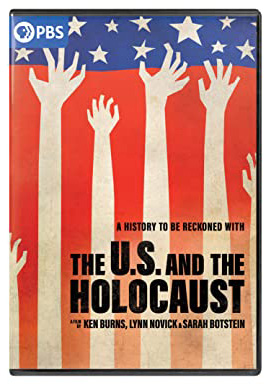 Watched the most recent Ken Burns’ documentary over the past couple of weekends on DVD (three discs, six hours). Searing, unsettling and – as usual – chock full of amazing photographs and movies, with a surprising number in color (still and video).
Watched the most recent Ken Burns’ documentary over the past couple of weekends on DVD (three discs, six hours). Searing, unsettling and – as usual – chock full of amazing photographs and movies, with a surprising number in color (still and video).
One of Burns’ finest efforts.
One thing that I had not noticed about Burns’ work before is the US-centric nature of his documentaries. I just hadn’t really realized this before. Sure, much of his work is on American-centric issues: Baseball, Prohibition, The Civil War. But look at the title of this documentary: not The Holocaust, but The U.S. and the Holocaust.
The same is true for his other not specifically US documentaries: The War (WWII) and The Vietnam War. Each film includes background and the actions of other countries, but the emphasis is on what these events meant to Americans.
Interesting.
This film – about the US and the Holocaust – gave mich of the backstory about Hitler’s rise to power and the imposition of the “Final Solution” (genocide; by raw numbers, higher for Jews), but a great deal of the emphasis was on the US’ actions and the stories of Jews who ended up in the US. And those who were turned away.
What struck me was how US politicians and military personnel, up to and including President Franklin Deleno Roosevelt, decried the persecution of non-Aryans in German-controlled Europe, but they always shied away from taking direct action to help throw a wrench in the genocidal apparatus, for fear of something going wrong and then US personal could potentially be killed just trying to “help the Jews” when there were other targets to hit. That was considered – over and over – and was deemed as just not acceptable.
Isn’t this, to some degree, anti-Semetic?
A couple of issues the documentary didn’t address, but that’s understandable given the breath of the issue:
- No mention of the brain drain, especially among Jewish scientists, the Holocaust created in Germany (think Einstein, rwin Schrodinger, Leo Szilard, Edward Teller). Many were current or future Nobel laureates, and many aided the Manhattan Project, which was a key to ending the war.
- Never really addressed if the Final Solution was a Hitler/Germany project or extended to other Axis countries (I think it was a German thing).
- No mention of how Stalin – an ally of sorts to Germany at the beginning of the war – had his own, much higher body count genocide later in the 20th Century. While the Nazi genocide seems more targetted at people deemed inferior to Aryans, and Stalin’s purges/gulags seemed more politically motivated, one still wonders if there was any connective tissue between the two – any :”lessons learned.” I just don’t know, and it wasn’t mentioned.
Unlike Baseball, which had interviews with everyone and their uncle, this film had only a half-dozen or so interviews interspersed within the footage (many small snippets throughout the six hours, but a finite number of interviewees, overall). Made for a tighter film, to me. On the other hand, not everyone in America has a connection to the Holocaust, but everyone loves baseball, so it worked there.
Not a film I will return to in the near future – it’s a bruising story to follow – but it’s well done and, given the rise in anti-semitism/white supremecy in the US as of late, it’s unfortunately very timely.
